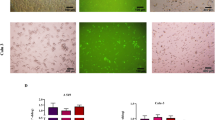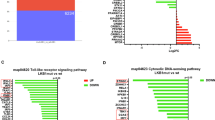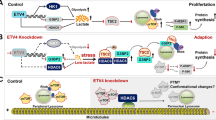Abstract
Aim:
Previous study has shown that endometrial cancers with LKB1 inactivation are highly responsive to mTOR inhibitors. In this study we examined the effect of LKB1 gene status on mTOR inhibitor responses in non-small cell lung cancer (NSCLC) cells.
Methods:
Lung cancer cell lines Calu-1, H460, H1299, H1792, and A549 were treated with the mTOR inhibitors rapamycin or everolimus (RAD001). The mTOR activity was evaluated by measuring the phosphorylation of 4EBP1 and S6K, the two primary mTOR substrates. Cells proliferation was measured by MTS or sulforhodamine B assays.
Results:
The basal level of mTOR activity in LKB1 mutant A549 and H460 cells was significantly higher than that in LKB1 wild-type Calu-1 and H1792 cells. However, the LKB1 mutant A549 and H460 cells were not more sensitive to the mTOR inhibitors than the LKB1 wild-type Calu-1 and H1792 cells. Moreover, knockdown of LKB1 gene in H1299 cells did not increase the sensitivity to the mTOR inhibitors. Treatment with rapamycin or RAD001 significantly increased the phosphorylation of AKT in both LKB1 wild-type and LKB1 mutant NSCLC cells, which was attenuated by the PI3K inhibitor LY294002. Furthermore, RAD001 combined with LY294002 markedly enhanced the growth inhibition on LKB1 wild-type H1792 cells and LKB1 mutant A549 cells.
Conclusion:
LKB1 gene inactivation in NSCLC cells does not increase the sensitivity to the mTOR inhibitors. The negative feedback activation of AKT by mTOR inhibition may contribute to the resistance of NSCLC cells to mTOR inhibitors.
Similar content being viewed by others
Log in or create a free account to read this content
Gain free access to this article, as well as selected content from this journal and more on nature.com
or
References
Siegel R, Naishadham D, Jemal A . Cancer statistics, 2012. CA Cancer J Clin 2012; 62: 10–29.
Vaahtomeri K, Mäkelä TP . Molecular mechanisms of tumor suppression by LKB1. FEBS Lett 2011; 585: 944–51.
Shah U, Sharpless NE, Hayes DN . LKB1 and lung cancer: more than the usual suspects. Cancer Res 2008; 6810: 3562–5.
Herrmann JL, Byekova Y, Elmets CA, Athar M . Liver Kinase B1 (LKB1) in the pathogenesis of epithelial cancers. Cancer Lett 2011; 306: 1–9.
Inoki K, Zhu T, Guan KL . TSC2 mediates cellular energy response to control cell growth and survival. Cell 2003; 115: 577–90.
Holz MK, Ballif BA, Gygi SP, Blenis J . mTOR and S6K1 mediate assembly of the translation preinitiation complex through dynamic protein interchange and ordered phosphorylation events. Cell 2005; 123: 569–80.
Rizzieri DA, Feldman E, DiPersio JF, Gabrail N, Stock W, Strair R, et al. A phase 2 clinical trial of deforolimus (AP23573, MK-8669), a novel mammalian target of rapamycin inhibitor, in patients with relapsed or refractory hematologic malignancies. Clin Cancer Res 2008; 14: 2756–62.
Rini BI . Temsirolimus, an inhibitor of mammalian target of rapamycin. Clin Cancer Res 2008; 14: 1286–90.
Wolpin BM, Hezel AF, Abrams T, Blaszkowsky LS, Meyerhardt JA, Enzinger PC, et al. Oral mTOR inhibitor everolimus in patients with gemcitabine-refractory metastatic pancreatic cancer. J Clin Oncol 2009; 27: 193–8.
Xu G, Zhang W, Bertram P, Zheng XF, McLeod H . Pharmacogenomic profiling of the PI3K/PTEN-AKT-mTOR pathway in common human tumors. Int J Oncol 2004; 24: 893–900.
Contreras CM, Akbay EA, Gallardo TD, Haynie JM, Sharma S, Tagao O, et al. Lkb1 inactivation is sufficient to drive endometrial cancers that are aggressive yet highly responsive to mTOR inhibitor monotherapy. Dis Model Mech 2010; 3: 181–93.
Sun L, Zhong D, Wu S, Bai H, Chen Z . Establishment and gene expression profiling of LKB1 stable knockdown lung cancer cell line. Chin Med J(Engl) 2011; 124: 2028–32.
Zhong D, Guo L, de Aguirre I, Liu X, Lamb N, Sun SY, et al. LKB1 mutation in large cell carcinoma of the lung. Lung Cancer 2006; 53: 285–94.
Nyfeler B, Chen Y, Li X, Pinzon-Ortiz M, Wang Z, Reddy A, et al. RAD001 enhances the potency of BEZ235 to inhibit mTOR signaling and tumor growth. PLoS one 2012; 7: e48548.
Zhu AX, Abrams TA, Miksad R, Blaszkowsky LS, Meyerhardt JA, Zheng H, et al. Phase 1/2 study of everolimus in advanced hepatocellular carcinoma. Cancer 2011; 117: 5094–102.
Rizell M, Andersson M, Cahlin C, Hafstrom L, Olausson M, Lindner P . Effects of the mTOR inhibitor sirolimus in patients with hepatocellular and cholangiocellular cancer. Int Clin Oncol 2008; 13: 66–70.
Meric-Bernstam F, Gonzalez-Angulo AM . Targeting the mTOR signaling network for cancer therapy. J Clin Oncol 2009; 27: 2278–87.
Shackelford DB, Shaw RJ . The LKB1-AMPK pathway: metabolism and growth control in tumour suppression. Nat Rev Cancer 2009; 9: 563–75.
O'Reilly KE, Rojo F, She QB, Solit D, Mills GB, Smith D, et al. mTOR inhibition induces upstream receptor tyrosine kinase signaling and activates Akt. Cancer Res 2006; 66: 1500–8.
Sun SY, Rosenberg LM, Wang X, Zhou Z, Yue P, Fu H, et al. Activation of Akt and eIF4E survival pathways by rapamycin-mediated mammalian target of rapamycin inhibition. Cancer Res 2005; 65: 7052–8.
Chandarlapaty S, Sawai A, Scaltriti M, Rodrik-Outmezquine V, Grbovic-Huezo O, Serra V, et al. AKT inhibition relieves feedback suppression of receptor tyrosine kinase expression and activity. Cancer cell 2011; 19: 58–71.
Rodrik-Outmezguine VS, Chandarlapaty S, Pagano NC, Poulikakos PI, Scaltriti M, Moskatel E, et al. mTOR kinase inhibition causes feedback-dependent biphasic regulation of AKT signaling. Cancer Discov 2011; 1: 248–59.
Acknowledgements
This study was supported by grants from the National Natural Science Foundation of China (81071915 and 31301160) and the Tianjin Health Bureau (2011KZ107).
Author information
Authors and Affiliations
Corresponding author
Rights and permissions
About this article
Cite this article
Xiao, P., Sun, Ll., Wang, J. et al. LKB1 gene inactivation does not sensitize non-small cell lung cancer cells to mTOR inhibitors in vitro. Acta Pharmacol Sin 36, 1107–1112 (2015). https://doi.org/10.1038/aps.2015.19
Received:
Accepted:
Published:
Issue date:
DOI: https://doi.org/10.1038/aps.2015.19



